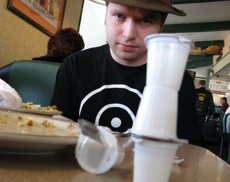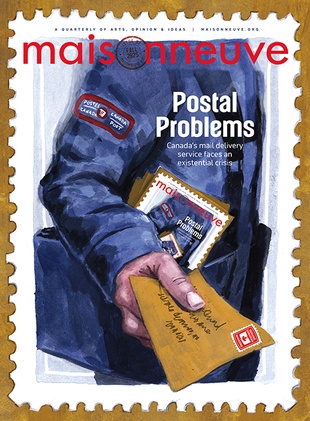Two Maisy Writers Try Their Hand at Chatroulette

Salvatore Ciolfi
Created by a 17-year-old Russian, Chatroulette is a website that lets you chat with strangers. There are no rules or screen names. All you have is your face staring back at you, and, above that, you staring at a stranger’s face. Its appeal is that if you don’t like someone, you roll the dice, click “next”, and another face appears (like a casino that never pays out). For a neurotic like me, this is a bit disconcerting, as most people disconnect before you have time to even type hey. I mean, just how hideous am I?
At any given time, there are roughly 30 thousand people you can be connected with. Essentially, it’s Omegle -- the other site that lets you chat with randomly selected users -- except with webcams. This innovation, however, has eliminitated any actual chatting, since everyone just wants to see who’s next, as if suddenly given unlimited satellite television after a lifetime of basic cable (Peep-roulette would be a better name).
Teenagers seem to think the finger is the best salute, and they generally act as if they were advocating the merits of forced sterilization. Much worse are the masturbators. Some are clothed, others naked. Some are lefties, some righties, while some involve poor, defenseless stuffed animals (don’t ask). As a viewing experience, it isn’t much, since these jerk-offs mostly zoom in on their ding dongs, until all you see is a penis being punished, back and forth, by some unseen power.
What are these guys looking for? Probably what I found: a pretty girl who smiled and promptly started stripping. The only thing that kept her from nudity was a friend who walked in on her. Of course, it’s possible that these girls are just tricking guys into thinking they’ve missed something special, like a chat version of Craigslist’s “Missed Connections”. That would be par for the course. There isn’t time to do anything susbtantial, so, you might as well try to get a rise out of people, a reaction.
The ultimate example of this are fake suicides, like the grainy image I saw of a dead hanging body. I looked at this for a long time, unsure what to say. Should I call someone? Do something? Evidently, this confusion is the goal. Why, I’m not sure, except that if you react, it’s almost like you’re letting them win, admitting you’re as boring and lame as all the rejections can make you feel.
“How’s it hanging?” I asked the hangman finally, clicking Next.
Better safe than sorry, I thought. After all, there a lot of strange people out there. 
Ryan McNutt
In a nutshell, Chatroulette is basically the staple of 1995 Internet—the chat room—with a 21st century twist. Instead of selecting a particular room to join, the service flips on your webcam the moment you click “start” and immediately throws you face-to-face with a random chatter. You’re free to talk to them, either by text or voice chat, or you can click “next” and in a flash abandon this person for someone else.
Without many rules beyond the power of clicking “next,” at lot seems to go down. Most distressing, of course, are those who get a sexual rush from the service. Even a casual browse through ChatRoulette finds more penises than a Harvey Keitel movie marathon.
Given the high perv-to-productive ratio, it’s a wonder that ChatRoulette finds an audience at all. And while its likely to be a quick-burn fad that comes and goes, that doesn’t negate its twisted appeal. What’s disturbing about Chatroulette isn’t just that people do disturbing things with it. It’s that the whole thing just makes so much sense.
The philosophy of “shuffle” is new to the world of chat, but hardly unique in the digital age. It’s best embodied in Apple’s iTunes and iPod, where sometimes the only way to deal with such a staggering volume of available music (almost 28 days worth, in my case) is to let fate take over and determine your playlist for the evening – that is, unless you don’t like what fate gives you, in which case the next song is only a click away. Online radio services like Pandora or Last.FM operate under a similar model, where any dislike can be quickly and easily dismissed for the next sound.
From there, we expand this model into other forms of media. I read a study once that found the average viewer clicks away from a YouTube video within eight seconds if they don’t plan on watching the rest. We build Twitter feeds following anyone we have the slightest interest in and quickly sort through them for anything relevant, quickly disregarding the rest. We build RSS feed aggregators with hundreds upon hundreds of websites and give each headline only a cursory glance before moving onto the next one. And, of course, there’s Google’s always curious “I’m Feeling Lucky” button.
In the digital age, this sort of quick judgment is the only way to survive. Though some blame this behavior on short attention spans, its more a reflection of the volume we’re all coping with. When we have what seems like the entirety of the world’s content at our fingertips – every song ever recorded, every video ever made, every news article ever written – why on earth would we spend any time with something that doesn’t make its value proposition immediately clear to us? The allure of “the other” is constantly calling our name, and who are we to deny it if what’s in front of us ceases to entertain?
Chatroulette certainly plays to this behaviour, but its randomness is a level beyond all these other examples, which is decidedly the point. Chatroulette offers you no choice in your experience aside from veto power. Instead, it provides a thrill uncommon on the Internet: the thrill of the total unknown, the thrill of discovery not through one’s own effort but through complete, unadulterated chance. It’s one of the few places in cyberspace where a person can abandon control of their digital destiny for a fleeting second and experience the primal thrill of uncertain possibility…and then, in a flash, trade it for another rush.





